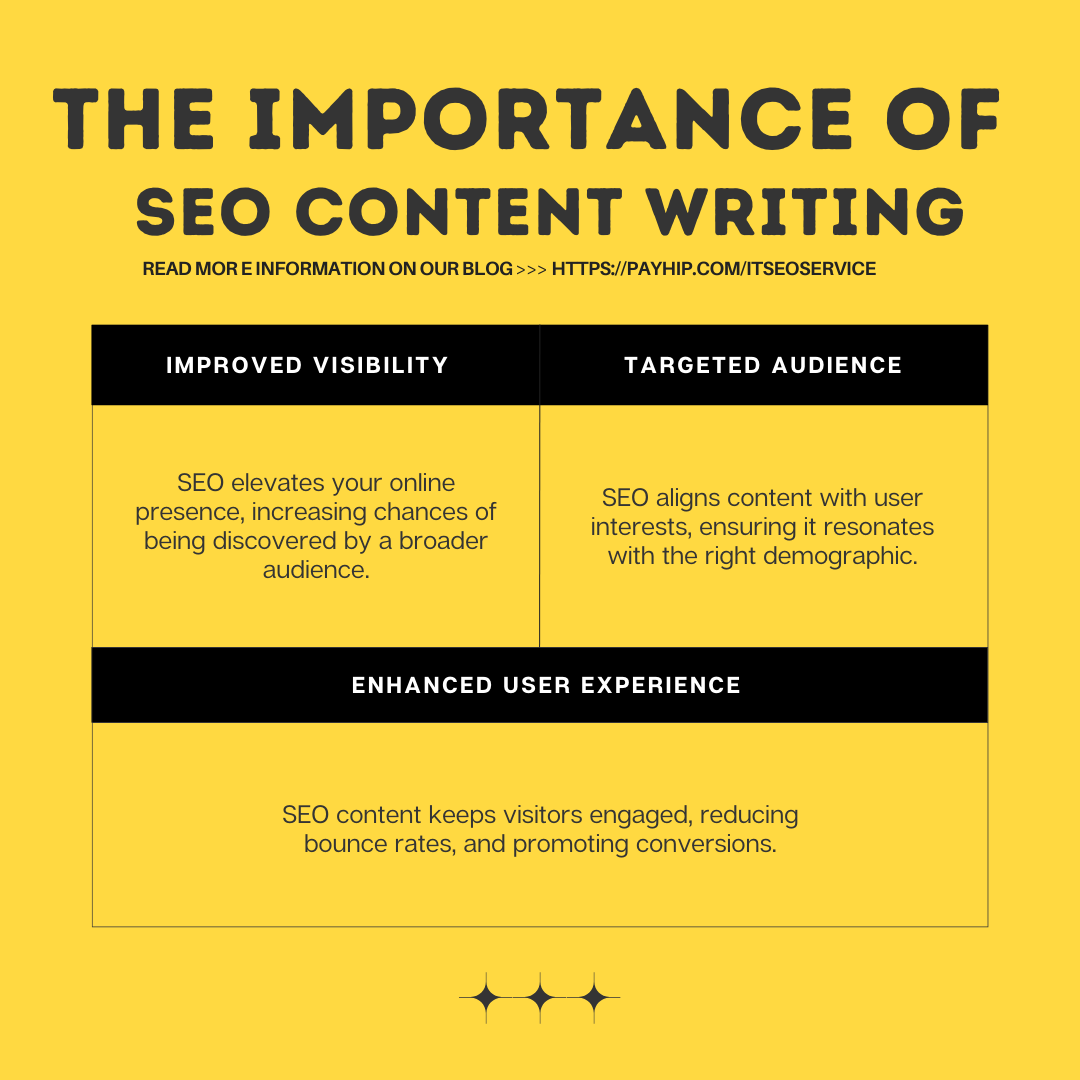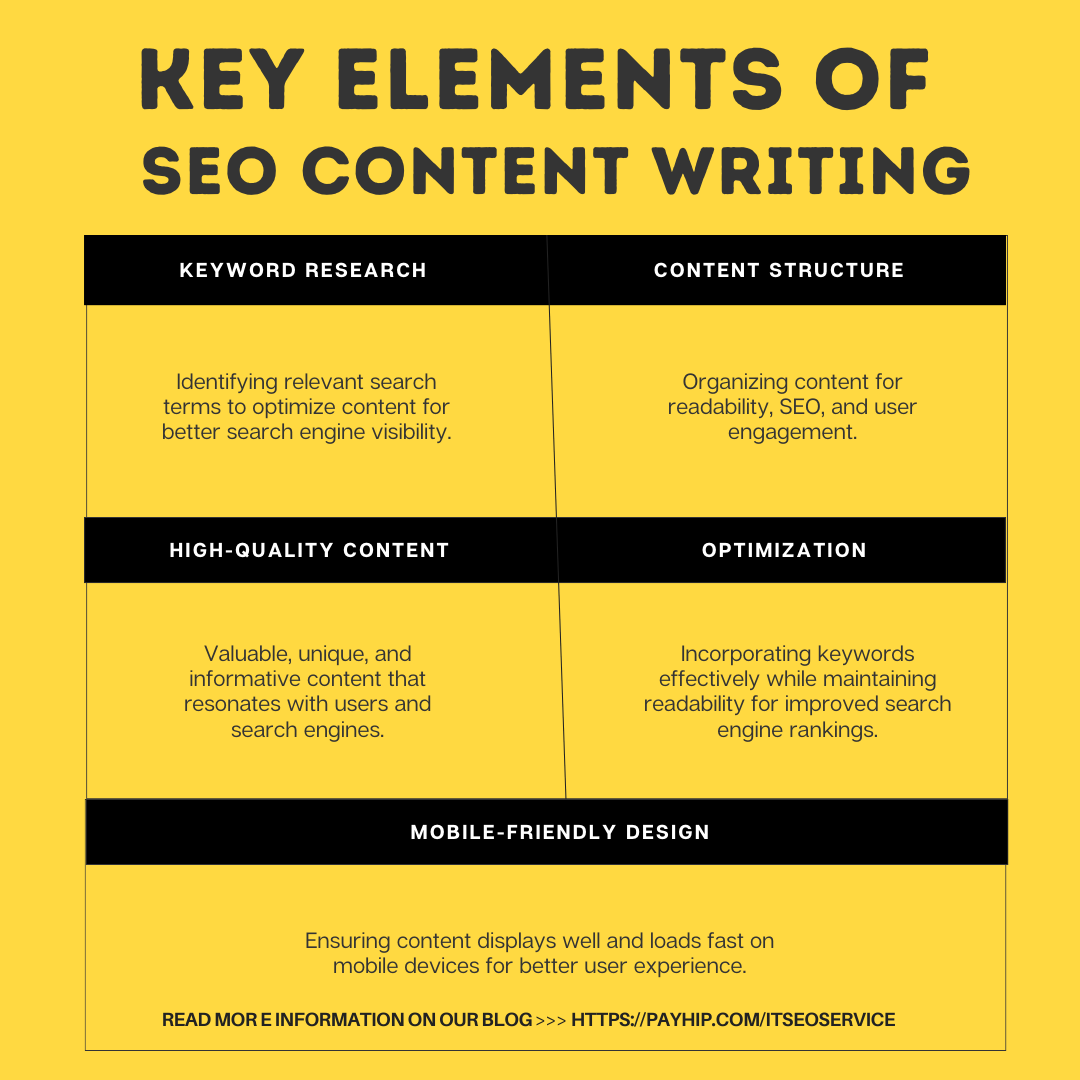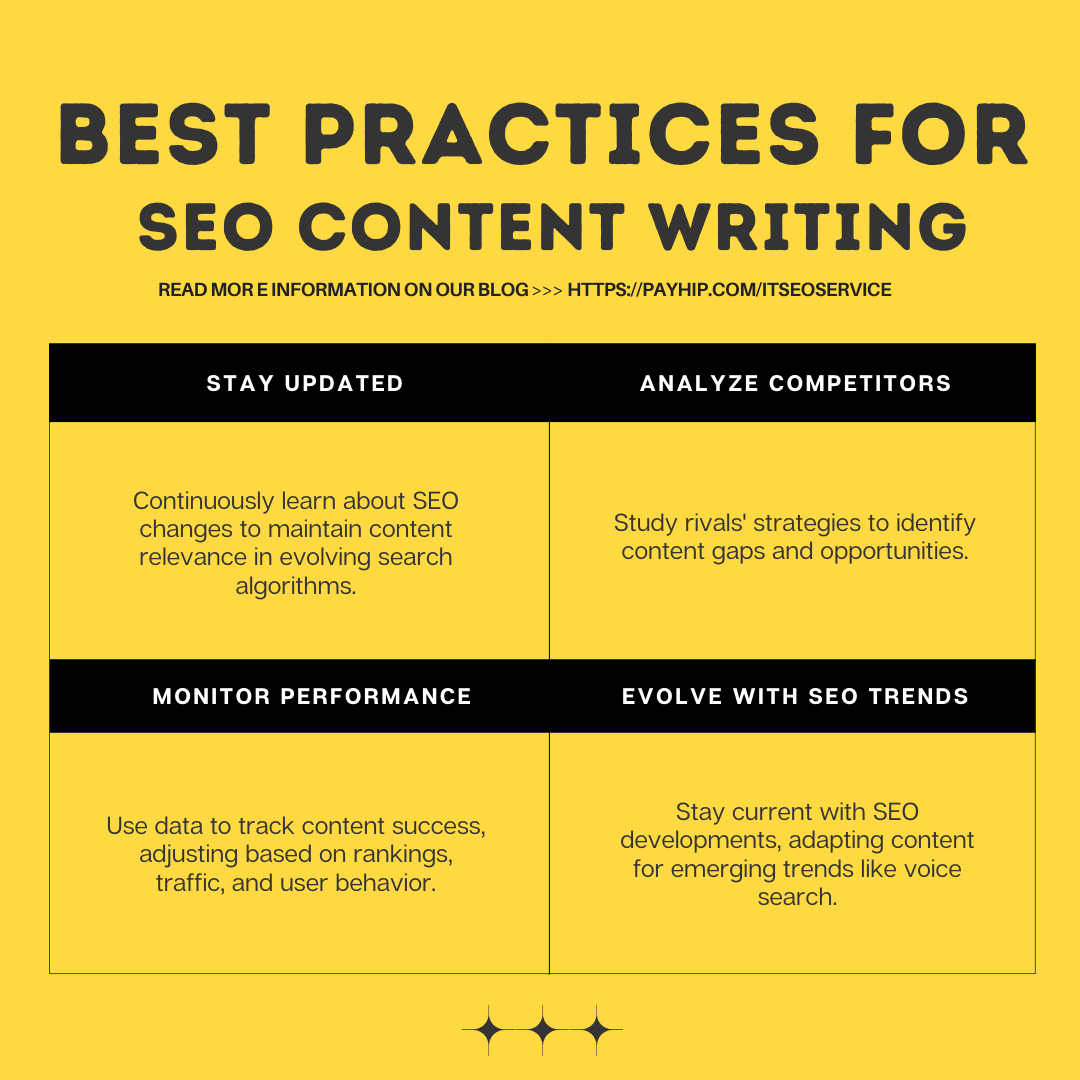SEO Content Writing is ….
In the digital age, where online visibility can make or break a business, SEO content writing has emerged as a crucial tool for achieving higher rankings on search engines. SEO, which stands for Search Engine Optimization, is the practice of optimizing web content to make it more appealing to search engines like Google, Bing, and Yahoo.
SEO content writing is a specialized form of writing that focuses on creating content that not only engages and informs the audience but also ranks well on search engine results pages (SERPs). In this article, we will delve into the world of SEO content writing, exploring its importance, key elements, and best practices.

The Importance of SEO Content Writing
SEO content writing is the linchpin that connects businesses and audiences. With search engines ruling the online realm, its significance cannot be overstated. This concise guide explores the vital role SEO content writing plays in enhancing online visibility, engagement, and success.
Improved Visibility
One of the fundamental objectives of SEO content writing is to enhance a website's visibility on search engines like Google. When you optimize your content for relevant keywords and phrases that users are searching for, it increases the likelihood of your content ranking higher in search results. Improved visibility is crucial because it means more people are likely to find and visit your website.
This increase in visibility can result in a substantial influx of organic (non-paid) traffic, which represents a valuable pool of potential customers and leads. Essentially, SEO content writing helps your website stand out in the crowded online space, making it easier for people to discover your business or brand.
Targeted Audience
SEO content writing enables you to precisely target your intended audience. By conducting thorough keyword research, you can identify the specific terms and phrases that your target audience is using when searching for information, products, or services related to your niche.
This valuable insight allows you to tailor your content to meet the needs, preferences, and search intent of your potential visitors. In essence, you're creating content that speaks directly to the interests and questions of your audience, increasing the likelihood that your website will attract the right visitors who are genuinely interested in what you have to offer.
Enhanced User Experience
SEO content writing goes beyond simply incorporating keywords; it's also about providing a high-quality user experience. Well-structured, informative, and engaging content not only satisfies the search engine algorithms but also keeps visitors on your site longer. When users find valuable information that answers their questions or provides solutions to their problems, they are more likely to stay on your website, explore further, and engage with your content.
This results in lower bounce rates (the percentage of visitors who leave your site quickly after arriving) and increases the chances of conversions, such as making a purchase, signing up for a newsletter, or contacting your business. In essence, good SEO content doesn't just attract visitors; it keeps them engaged and satisfied, contributing to your overall online success.

Key Elements of SEO Content Writing
To create effective SEO content, several key elements must be considered. In the dynamic landscape of digital marketing, crafting content that not only engages but also ranks well on search engines is paramount. This guide will delve into the essential components of SEO content writing, equipping you with the tools to succeed in the competitive online realm.
Keyword Research
Keyword research is the foundational step in SEO content writing. It involves identifying relevant keywords and phrases that users are likely to search for when looking for information related to your content. Tools like Google Keyword Planner and SEMrush can assist you in finding these keywords. Effective keyword research helps you target terms with high search volume and low competition, increasing the likelihood of your content being discovered by users.
Content Structure
A well-structured content layout enhances readability and user-friendliness. To achieve this, you should use headings, subheadings, bullet points, and short paragraphs to break up your content. These structural elements not only make it easier for readers to consume and understand the information but also improve search engine crawlability. Search engines can better understand and index your content when it's organized in a logical and hierarchical manner.
High-Quality Content
Quality should always take precedence over quantity in SEO content. Your content should be informative, engaging, and unique. Avoid duplicating content from other sources, as search engines penalize websites for this practice. Instead, aim to provide valuable and original information that directly addresses the user's query or problem. High-quality content not only satisfies user intent but also enhances your website's authority and trustworthiness.
Optimization
Optimizing your content involves incorporating keywords naturally into your text, including in the title, headings, and body. This helps search engines understand the topic of your content and match it to relevant user queries. However, it's essential to avoid overusing keywords, a practice known as keyword stuffing, as this can result in penalties from search engines. The goal is to strike a balance between keyword usage and readability, ensuring that your content flows naturally while targeting relevant search terms.
Mobile-Friendly Design
Given that a significant portion of internet traffic comes from mobile devices, it's crucial to ensure that your content is mobile-friendly. This means adopting a responsive design that adapts seamlessly to various screen sizes and ensuring fast page loading times. A mobile-friendly website not only enhances the user experience but also contributes positively to SEO rankings, as search engines prioritize mobile-friendly websites in their results.

Best Practices for SEO Content Writing
To excel in SEO content writing, consider the following best practices: In the digital realm, crafting content that not only captures the attention of your target audience but also ranks prominently in search engine results is essential. This comprehensive guide explores the proven strategies and techniques that can elevate your SEO content writing to the next level, driving organic traffic and maximizing online visibility.
Stay Updated
Search engines regularly update their algorithms, which are the rules governing how web pages are ranked in search results. This section emphasizes the importance of keeping current with the latest SEO trends and guidelines. What may have been effective in the past might not work today due to these algorithmic changes. Staying informed ensures that your content remains relevant and optimized for current search engine criteria.
Analyze Competitors
This practice involves examining the content strategies of your competitors. By doing so, you can identify both opportunities and gaps in your niche. Studying what your competitors are doing successfully allows you to create content that is more focused, competitive, and strategically positioned to outperform similar content from your rivals.
Monitor Performance
Regularly monitoring your content's performance is essential to evaluate its effectiveness. Tools such as Google Analytics and Google Search Console provide valuable data on various metrics, including rankings, organic traffic, and user behavior. By tracking these metrics, you gain insights that enable data-driven improvements to your content strategy. You can optimize underperforming content and replicate the success of well-performing pages.
Evolve with SEO Trends
SEO is a dynamic field that continually evolves. It is essential to keep a close watch on emerging trends, such as voice search optimization and featured snippets, which are new and evolving elements of search engine optimization. Adapting your content strategy to align with these emerging trends can give your content a competitive edge and help it remain visible to your target audience as search behavior evolves.
In conclusion, SEO content writing is a vital component of any successful online presence. By optimizing your content for search engines while providing value to your audience, you can improve your website's visibility, attract a targeted audience, and ultimately achieve your online goals. It's a dynamic and continually evolving field, so staying informed and adapting to new trends is essential for long-term success in SEO content writing.

